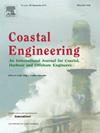A framework for national-scale coastal storm hazards early warning
Abstract
National weather forecasting agencies routinely issue a range of hazard warnings. But to our knowledge, along sandy coastlines where storm waves and storm surge can result in widespread but location-specific beach erosion and beachfront flooding, no national-scale early warning service for these hazards is presently operational. This paper outlines the scientific basis and implementation of a new framework for large area coastal storm hazards forecasting, currently being tested along the southwest (Indian Ocean) and southeast (Pacific Ocean) coasts of Australia. The system provides 7-day rolling predictions of localized beach erosion and/or coastal flooding linked to forecasted extreme weather events. Coastal setting influences the nature and occurrence of these hazards, with sandy beaches along wave-dominated coasts more prone to erosion and at surge-dominated coasts to flooding. An existing nearshore water-level forecasting system and a new inshore wave modeling capability are used to forecast beach erosion and coastal flooding at every 100 m along the shore. At the regional scale O(100–1 000 km of coastline), a threshold-based decision tree model categorises the predicted extent, location, and severity of erosion and flooding. At a more local scale O(100–1 000 m), physics-based modeling using XBeach focuses on vulnerable or high-value locations, providing specific storm hazard indicators tailored to local needs. This two-tier approach is feasible for national implementation due to the reduced computational effort, limiting intensive modeling to pre-identified critical locations. Delft-FEWS manages the data and modeling workflow, ensuring scalability and compatibility with existing forecast infrastructure. Initial evaluations of the system are promising, with a detailed 2-year evaluation in progress. Future enhancements could include the use of satellite imagery for real-time beach width and dune topography assimilation and exploring alternative modeling approaches to further improve forecast accuracy.

 求助内容:
求助内容: 应助结果提醒方式:
应助结果提醒方式:


